Home
Colon Broom Independant Reviews - The End Of Lies And The Birth Of Wisdom
Colon Broom Independant ReviewsIt lists down ingredients, suggested serving size, and amount per serving. During our research, we analyzed the information on the ColonBroom label to determine the active ingredients in the dietary supplement. The high fiber content in ColonBroom may cause you bloating in the first few days, which is totally normal! The feeling fades after 72 hours, leaving you feeling lighter. Adding ColonBroom to your diet regime is simple like any dietary supplement in the market. However, it doesn’t mean that you should consult a physician.
How Much Weight Can I Lose With Colon Broom - Why Is Not One Person Talking About This Matter
The fibers with the highest impact on sterol metabolism (e.g. pectin) are fermented in the colon. It is therefore unlikely that the decrease in body cholesterol is due adsorption to the fermented fiber in colon. During absorption, water must be absorbed at a rate commensurate with the absorption of solutes. The unstirred waters layer covering the microvillus membrane has an effect on the transport of both passively and actively absorbed nutrients through epithelium. These variables include chemical structure, polymer content, molecular weight and degree of chain branching. You could add beans to a soup or salsa, or even to a salad.
What fruit is high in fiber?
According to WebMD, glucomannan is used to treat Type 2 diabetes, high cholesterol and constipation. When submerged in water, glucomannan expands up to 17 times its original volume. In small doses, glucomannan may be an effective bulking fibre.
However, many Americans fall short of the recommended daily amount in their diets. Women should aim for around 25g fiber per daily, while men should aim about 38g, or 14g per 1,000 calories. Dietary fiber adds bulk to your diet and makes you feel full faster, helping you control your weight. Excessive intake of dietary fiber can cause gas, bloating and cramps. A review of 44 studies on fiber treatment found that only viscous fibres reduce food intake and cause weight loss. Beans and legumes are the most nutritious whole-food sources to fermentable fibers.
The sensory analysis of the bread with 14% AX rich fiber showed no significant differences. This definition provides a more detailed description of the components and its genetic makeup. Additionally, few changes are required for its analysis because of the changes made in its description.
Colon Broom Independant ReviewsColon Broom Challenge

My colleagues and me are starting a study this month. We realized that there was a gap in our knowledge about suitable dietary fiber supplements that could go along with low-FODMAP diets. Fiber supplementation is generally safe. There have been very few adverse events. Patients with fecal impaction should not be given fiber supplementation. Instead, laxatives should first be used followed by appropriate fiber supplementation. Certain fibers are highly fermentable and can lead to excessive gas, bloating, diarrhea, and discomfort or pain.
How Is Colon Broom Different From Metamucil - What The Authority Figures Are Talking About
Liven up a dull salad by adding nuts, seeds, kidney beans, peas, or black beans. Artichokes are high in fiber, and can be used as a snack or added to salads. Beans, peas, lentils, and rice make tasty high-fiber additions to soups and stews.
It can also reduce food cravings and provide users with a feeling satisfaction, thereby controlling hunger pangs. Glucomannan is also known to increase the production and release of happy hormones. This can help relax the brain, reduce stress, and even alleviate some symptoms. It reduces stress-related binging and creates sustainable caloric deficits. The colon cleansing method is believed to remove toxins from the gastrointestinal tract, which can lead to a variety health problems like high blood pressure and arthritis.
Overall Health
It is made up of a proprietary blend dietary fibre that is plant-based and has anti-inflammatory properties. It's a great choice if you need to boost your fiber, improve your bowel movements, or suffer from constipation. Colon Broom can be used as a natural, plant-based supplement to fibers and not as a medicine. Colon Broom, a natural fiber found in psyllium husk, is used as a mild, bulk-forming laxative.
Colon Broom Complaints - Escaping The Lies
We choose the products and services we review based primarily on consumer interest. Recent research at Georgia State University revealed that mice who ate diets lacking in fiber (specifically soluble fiber) gained weight and had more bodyfat than mice who ate fiber-rich diets. Furthermore, mice that were given sufficient soluble fiber had a resistance to fat gain even when fed high-fat diets.
Colon Broom Independant ReviewsPrevious Next
Top Articles:
Negative Reviews About Colon Broom - Fraud, Confusion, And Totally BS About This Product Finally Exposed
Is Colon Broom Safe For Breastfeeding - Unknown Details Unveiled By The Authorities
Where Can I Buy Colon Broom - What You Don't Know But Need To About This Product
Colon Broom Promo Code - Unidentified Factual Statements Unveiled By The Authorities
Is Colon Broom A Scam - The Truth Finally Unmasked
***
Categories
Copyright© Colon Broom All Rights Reserved Worldwide